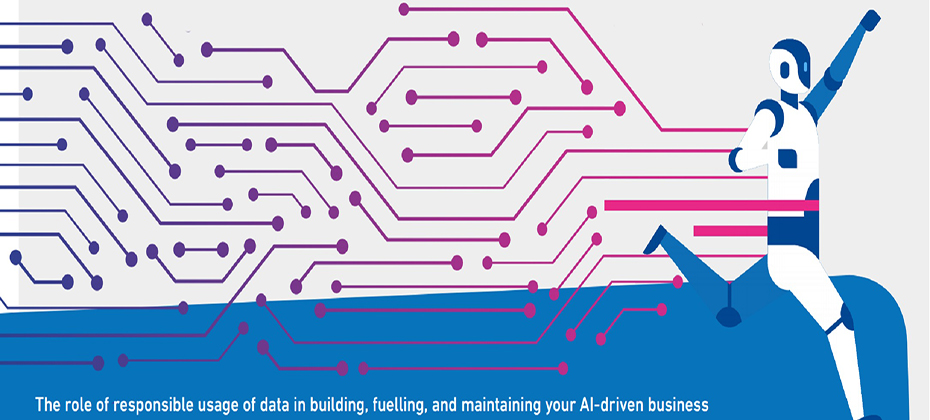Data & Analytics
Experian is committed to using data as a force for good. We continue to explore new ways to harness our data and resources to drive financial inclusion, facilitate access to fair and affordable credit for consumers and help them improve their financial well-being. Read about our latest data news below:

In today's fast-paced markets, businesses of all sizes strive for an edge over competition, especially when it comes to wining over consumers' hearts and minds. Many find that competitive advantage in the way they apply artificial intelligence to improve their customer decision-making for high business performance. Data strategies for high-performance decisioning In today's fast-paced markets, businesses of all sizes strive for an edge over competition, especially when it comes to wining over consumers' hearts and minds. Many find that competitive advantage in the way they apply artificial intelligence to improve their customer decision-making for high business performance.In fact, recent research we commissioned from Forrester Consulting shows that this. The ability to make meaningful decisions that match your customer's context at a given point in time requires a solid understanding of their needs and goals. Having access to relevant data is essential to consistently deliver experiences that matter. Timing and availability of data is equally important to improving your customer-level decision-making; to make those sought-after better, contextual decisions, you need to have the pertinent data available at the right place and time to meet that given consumer's moment of need. For example, in an operational environment, this may translate into accessing the right type, amount and quality of data in real time, so you are able to respond how and when your customer expects. The role of responsible usage of data in building, fuelling, and maintaining your AI-driven business The energy needs of athletes exceed those of the average person. Similarly, in the AI world, data (nutrient) needs for high-performance require consistent markers over a long period of time. Data scientists looking after credit and fraud risk would use the same variables or 'nutrients' that have been traditionally used for conventional scorecard developments to fuel machine learning methods to build predictive models. These are 'proteins' such as application data, any behavioural data your business has on existing customers, credit bureau data, segmentation data, available public information or transaction data. Some trended economic data can be used as input for developing credit risk methods and governance to fit leading financial reporting standards and frameworks (think of IFRS 9 or Basel, for example). Similarly, to assess affordability, you will need to feed your algorithms with disposable income over your customers' lifetime plus data about how they use it. Financial data about customers' savings, and investments allows for more accurate risk management while property related info derived from rental data is useful for extending personalised credit offers. Meanwhile, more and more businesses are using speech and text data obtained through voice recognition to improve the collection process. In fact, recent research we commissioned from Forrester Consulting shows that this 'race for the customer' comes down to who knows them best. The ability to make meaningful decisions that match your customer's context at a given point in time requires a solid understanding of their needs and goals. Having access to relevant data is essential to consistently deliver experiences that matter. Timing and availability of data is equally important to improving your customer-level decision-making; to make those sought-after better, contextual decisions, you need to have the pertinent data available at the right place and time to meet that given consumer's moment of need. For example, in an operational environment, this may translate into accessing the right type, amount and quality of data in real time, so you are able to respond how and when your customer expects. The role of responsible usage of data in building, fuelling, and maintaining your AI-driven business The energy needs of athletes exceed those of the average person. Similarly, in the AI world, data (nutrient) needs for high-performance require consistent markers over a long period of time. Data scientists looking after credit and fraud risk would use the same variables or 'nutrients' that have been traditionally used for conventional scorecard developments to fuel machine learning methods to build predictive models. These are 'proteins' such as application data, any behavioural data your business has on existing customers, credit bureau data, segmentation data, available public information or transaction data. Some trended economic data can be used as input for developing credit risk methods and governance to fit leading financial reporting standards and frameworks (think of IFRS 9 or Basel, for example). Similarly, to assess affordability, you will need to feed your algorithms with disposable income over your customers' lifetime plus data about how they use it. Financial data about customers' savings, and investments allows for more accurate risk management while property related info derived from rental data is useful for extending personalised credit offers. Meanwhile, more and more businesses are using speech and text data obtained through voice recognition to improve the collection process.

To stay ahead of the competition and on the path of sustained growth, you need clear line of sight to both risks and opportunities through the customer lifecycle. Gaining better insights on customers is critical to achieving that, so you can make all the right decisions, big and small, about your customers and business clients. Based on the conversations we have with our clients, we have noticed that most executives are paying a lot of attention to measuring customer experience and reducing friction across digital touch-points through the lifecycle. For customer acquisition, for example, businesses like yours look at time spent on each micro-step (e.g. data field), dropout rates at each of those steps, and do A/B testing at a very granular level. The idea is to understand all points of friction including points of confusion, frustration, etc., so you can learn from those and improve the experience. But this is not an easy task. The various challenges involved are making sense of the vast quantities of data and the immaturity of that data as well as the construct of that data. Given the fast pace at which data analytics change and evolve, our recommendation is that you invest in tools that are data and/or analytics agnostic. Thinking ahead: leveraging data analytics and cloud-based decisioning platforms to design the right customer treatment There is a largely untapped opportunity to leverage data, analytics, optimisation and decision management solutions - such as cloud-based decisioning platforms - to design the right customer treatment and identify the next best action for that customer. Selecting the appropriate timing, medium, and channel for those actions lead to greater consistency and contribute to having more relevant communications with your customers. The more relevant you are, the more precise you are with the offers and the treatments leading to improved response rates, greater connectivity and interaction with the customer. This results in memorable experiences that enhance loyalty and drive profitability.

I recently had the opportunity to discuss the current state of #data collection, analytics, and AI in an interview with @CIODive. As technology advances, businesses can collect and analyse more data than ever before. However, most of that information ends up languishing, seldom being used or even catalogued. Recent research suggests that partly, this happens because businesses are unaware of what data they store or don't know how to get actionable insights out of it. This lack of visibility into data stores affects organisations' readiness to apply artificial intelligence (AI) and machine learning (ML): advanced analytics require data to be properly managed and organised. At Experian, we believe in taking an outcome-focused approach to analytics and AI as we look at activating the power of our data AI outcomes. We work backwards, from high-impact client and consumer outcomes, and bringing to bear the analytics, AI and data to achieve them. This way, we can assess more accurately what effort across data collection and analytics is required to achieve an outcome. Executed effectively this can avoid an enormous amount of investment in people, time, data. If you're interested in this topic, I'd recommend you to read the article in full: http://bit.ly/AImlShri_CIODive

Retailers are already starting to display their Christmas decorations in stores and it’s only early November. Some might think they are putting the cart ahead of the horse, but as I see this happening, I’m reminded of the quote by the New York Yankee’s Yogi Berra who famously said, “It gets late early out there.” It may never be too early to get ready for the next big thing, especially when what’s coming might set the course for years to come. As 2019 comes to an end and we prepare for the excitement and challenges of a new decade, the same can be true for all of us working in the lending and credit space, especially when it comes to how we will approach the use of alternative data in the next decade. Over the last year, alternative data has been a hot topic of discussion. In fact if you typed “alternative data and credit” into a Google search today you would get more than 200 million results. That’s a lot of conversations, but while nearly everyone seems to be talking about alternative data, we may not have a clear view of how alternative data will be used in the credit economy. How we approach the use of alternative data in the coming decade is going to be one of the most important decisions the lending industry makes. Inaction is not an option, and the time for testing new approaches is starting to run out – like Yogi said, it’s getting late early. And here’s why: millennials. We already know that millennials tend to make up a significant percentage of consumers with so-called “thin-file” credit reports. They “grew up” during the Great Recession and that has had a profound impact on their financial behavior. Unlike their parents, they tend to have only one or two credit cards, they keep a majority of their savings in cash and, in general, they distrust financial institutions. However, they currently account for more than 21 percent of discretionary spend in the U.S. economy, and that percentage is going to expand exponentially in the coming decade. The recession fundamentally changed how lending happens, resulting in more regulation and a snowball effect of other economic challenges. As a result, millennials must work harder to catch up financially and are putting off major life milestones that past generations have historically done earlier in life, such as home ownership. They more often choose to rent and, while they pay their bills, rent and other factors such as utility and phone bill payments are traditionally not calculated in credit scores, ultimately leaving this generation thin-filed or worse, credit invisible. This is not a sustainable scenario as we enter the next decade. One of the biggest market dynamics we can expect to see over the next decade is consumer control. Consumers, especially millennials, want to be in the driver’s seat of their “credit journey” and play an active role in improving their financial situations. We are seeing a greater openness to providing data, which in turn enables lenders to make more informed decisions. This change is disrupting the status quo and bringing new, innovative solutions to the table. At Experian we have been testing how advanced analytics and machine learning can help accelerate the use of alternative data in credit and lending decisions. And we continue to work to make the process of analyzing this data as simple as possible, making it available to all lenders in all verticals. To help credit invisible and thin-file consumers gain access to fair and affordable credit, we’ve also recently announced Experian Lift, a new suite of credit score products that combines exclusive traditional credit, alternative credit and trended data assets to create a more holistic picture of consumer creditworthiness that will be available to lenders in early 2020. This new Experian credit score may improve access to credit for more than 40 million credit invisibles. There are more than 100 million consumers who are restricted by the traditional scoring methods used today. Experian Lift is another step in our commitment to helping improve financial health of consumers everywhere and empowers lenders to identify consumers who may otherwise be excluded from the traditional credit ecosystem. This isn’t just a trend in the United States. Brazil is using positive data to help drive financial inclusion, as are other around the world. Like I said, it’s getting late early. Things are moving fast. Already we are seeing technology companies playing a bigger role in the push for alternative data – often powered by fintech startups. At the same time there also has been a strong uptick in tech companies entering the banking space. Have you signed up for your Apple credit card yet? It will take all of 15 seconds to apply, and that’s expected to continue over the next decade. All of this is changing how the lending and credit industry must approach decision making, while also creating real-time frictionless experiences that empower the consumer. We saw this with the launch of Experian Boost earlier this year. The results speak for themselves: hundreds of thousands of previously thin-filed consumers have seen their credit scores instantly increase. We have also empowered millions of consumers to get more control of their credit by using Experian Boost to contribute new, positive phone, cable and utility payment histories. Through Experian Boost, we’re empowering consumers to play an active role in building their credit histories. And, with Experian Lift, we’re empowering lenders to identify consumers who may otherwise be excluded from the traditional credit ecosystem. That’s game changing. Disruptions like Experian Boost and newly announced Experian Lift are going to define the coming decade in credit and lending. Our industry needs to be ready because while it may seem early, it’s actually getting late.

As a member of the Forbes Technology Council, I get to publish articles on some of the latest technology trends and best practices. A recent piece, entitled “Are we comfortable with machines having the final say?”, deals with the sensitive issue of decisions being made by complex algorithms and how it impacts all areas of our lives. The article takes a closer look at high-impact decisions, such as loan determinations and health diagnosis, where the lack of understanding how algorithms may be used is becoming of increasing concern. In this context, it raises the importance of Explainable AI (XAI). This is a concept where technology and science are being used to explain how an algorithm or machine reaches a decision and tries to do this in a way that is transparent to users. However, this approach is still being tested and is only used in certain limited circumstances. As humans, we are taught to explain our decisions but we all know how difficult it is - and science has repeatedly shown how easily biased we are. XAI still has some way to go, but we can inspect, test and pick machines apart in a way we can never do with the human mind. So perhaps one day we will find a way to truly explain a machine’s decision. Whether that would make us comfortable with the machines having the final say, is still to be seen. Check out the full article here.

We are delighted to announce our investment in bonify, a German fintech start-up dedicated to giving consumers better insights into their creditworthiness. bonify gives its 500,000 customers easy access to their creditworthiness and financial data, offering them a number of financial management tools to help analyse and optimise their financial situation. At Experian, we believe very deeply in the power of data to help improve people’s lives. That’s why we’re so excited by bonify’s continued goal to improve its users’ financial lives, and the steps it is taking to help people in Germany understand and benefit from their financial information. We are delighted to join a number of investors in supporting the growth of this innovative start-up. Charles Butterworth, Managing Director Experian UK, Ireland and EMEA, said: "We are excited by the way bonify is helping people in Germany understand, engage with and improve their credit scores. We look forward to supporting the team as an investor and partner in their future growth.“ Founder and CEO of bonify, Dr. Gamal Moukabary, said: “Experian's investment shows that we are on the right track. It rewards our achievements and our unique value proposition. Experian is an ideal investor and partner for us to support the next growth phase. Our goal is to expand our operations into other European countries.” Manuel Silva Martínez, Partner and Head of Investments, Santander InnoVentures, added: “We are delighted to welcome Experian Ventures to bonify. Experian will add tremendous value and technical expertise to bonify’s product roadmap. We are thrilled to support bonify as we accelerate growth and help more and more people across Germany and Europe with taking control of their finances in a sound and responsible way.

It gives me great pleasure to announce that Experian has won the Consensus Economics Forecast Accuracy Award 2018 for the UK. Our UK Economics Team was recognised for their high-quality research, their commitment to regular forecasts and their ability to identify most accurately the trends and levels of key indicators over the 24-month forecasting cycle. The Forecast Accuracy Award program recognises the achievements of a select group of expert country economic forecasters who have most accurately predicted the performance of GDP growth and Consumer Price Inflation for their targeted economies over a 24-month forecasting cycle. Experian were the most accurate UK forecaster out of pool of 36 organisations. Mohammed Chaudhri, Head of UK Macro Forecasting, said: “We’re thrilled to win this award. We spent a lot of time analysing the UK economy following the referendum vote in 2016 and, at the time, many forecasters were expecting an immediate recession. However, we felt that the UK economy would prove more resilient in the coming years. We are pleased that our forecast for 2018 was so close to the actual development.” The award underlines the wealth of knowledge across the UK Economics Team, with over 30 years of macro-economic forecasting experience to their name. The accuracy of our economic forecasts is a real benefit when understanding how the UK economy will impact businesses in the future. By embedding our forecasts into the decision-making process organisations can embrace the opportunities presented by an ever-changing economics landscape. I’d like to congratulate Mohammed and his team on a well-deserved award win, along with all the other winners from across the globe. To find out more, click here.

The following is written by Colin Grieves, Managing Director of Targeting, at Experian. There are many reasons why an advert might catch your attention - maybe it’s because of a celebrity endorsement, clever catchphrase, or a witty one-liner that catches you off guard when you’re waiting for your programme to return after the break. If there has been an advert that has particularly stuck in your mind, those behind the marketing at organisations will tell you it’s no accident. Experian works with a range of organisations to help them understand which people are likely to be most interested in. So, how can you find out what information marketers use to understand you? Experian launched the Consumer Information Portal, or CIP for short, back in April 2018 to help people see what data we have access to, but also to give you the chance to let us know if you want to stop your data being used for marketing. The CIP also explains why our work in marketing can be a good thing for consumers and society as a whole. We’ve recently made improvements to the website to give you an even greater insight. You can now visit our website and promptly check whether your personal data is present on specific marketing channels, what sectors it’s used by, and where we obtained the data from. For the first time, you can also see with which marketing profile your postcode is associated here. This gives you a real flavour of how marketers may view you and the type of people most likely to live in your neighbourhood, to make sure the messages you receive are as relevant as possible. We’re planning to keep adding more new features and information to the CIP, as we keep our promise to deliver transparent and responsible marketing. Drawing on expertise across our business to improve your experience when you use the CIP, as well as looking at new, clearer ways to explain how we work with data in our marketing services. Watch this space for further updates.

Fraud attacks continue to increase, and businesses and consumers alike are recognizing the need for more effective preventative measures. In June 2016, we launched the industry’s first open platform designed to catch fraud faster, improve compliance, and enhance the customer experience. Experian CrossCoreTM has put more control in the hands of fraud teams and it continues to receive global recognition for its impact in the industry. We are proud to announce that CrossCoreTM has been named a market leader for fraud prevention by Cyber Defense Magazine’s 7th Annual InfoSec Awards. Judged by an independent panel of certified security professionals, the InfoSec Awards recognize the best ideas, products and services in the information technology industry. In the past year, the platform was also named best fraud prevention innovation by Cybersecurity Breakthrough and as best cybersecurity initiative of the year by CIR Magazine. Since 2016, Experian has been proud to serve organizations looking for better ways to get more out of their existing fraud and identity systems and to more effectively deploy new products and offers, while improving the customer experience and minimizing risk. According to Experian’s 2019 Global Identity & Fraud Report, 55% of businesses reported an increase in online fraud-related losses over the past 12 months, predominantly around account origination and account takeover attacks. Our study shows that consumers value security and convenience. They also expect to be recognized and met with a personalized experience. Businesses can deliver both security and convenience, but to do so, they need to apply the right tools and relevant information. CrossCoreTM is helping fraud teams around the world accomplish this by adapting and deploying strategies that keep up with the pace of fraud while reducing burdens on IT and data science teams. Learn more about CrossCore.